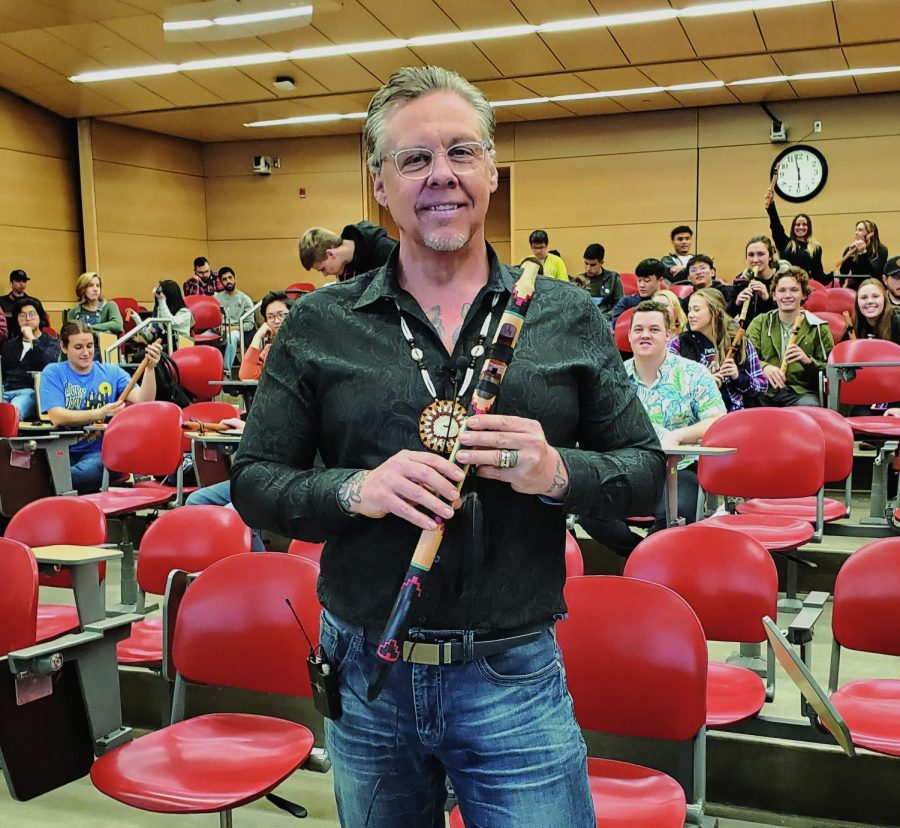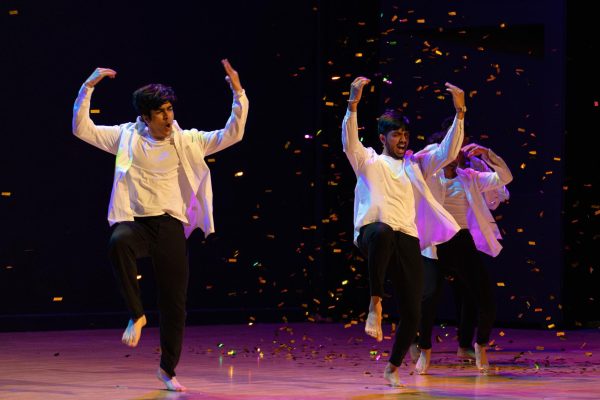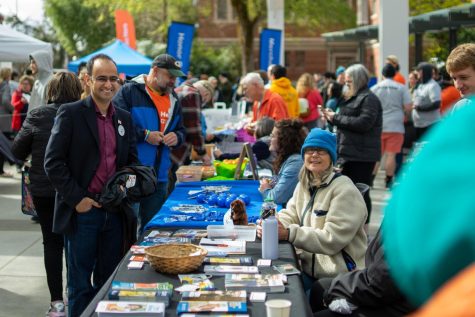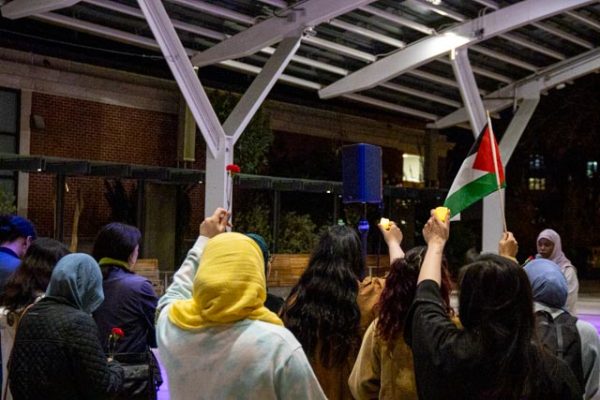OSU professor aims to foster diversity, creativity through Native American flute
December 2, 2019
Jan Michael ‘Looking Wolf’ Reibach is a Native American musician who has had an internationally recognized career in Native Flute before becoming a professor at Oregon State University.
Reibach is part of the Kalapuya tribe, one of the Confederated Tribes of Grand Ronde, and works today on indigeounous Kalapuya homeland in Corvallis, Ore.
He created and teaches Native Flute, a three-credit class that fills the Cultural Diversity requirement for the baccalaureate core at Oregon State. Through the class, Reibach aims to promote cultural diversity and musical self-expression by teaching students to play the Native American flute, the third oldest known musical instrument in the world.
No prior musical experience is required, and his students are tasked with the creation of original compositions on the native flute.
“Musical self-expression is an inherent right that we all share, each and every one of us, regardless of our heritage. We all have indigenous ancestors that were rooted in oral tradition, that included expressing their feelings through music regularly,” Reibach said.
“It’s incredibly welcoming,” said Samuel Price, second-year student in chemical engineering, and former student of Native American flute. “He makes students want to be there. Half the class is learning to play Native American flute, and half is learning the oral histories of the tribe. It’s not expected, but very welcomed.”
Reibach has been listed on the Daily Barometer’s “Best of Campus” poll for favorite baccalaureate core, and is the organizer of Oregon State’s world record-holding Native American flute circle. He aims to create a safe space for cultural differences on campus, and said he believes his classroom is among the most culturally diverse at OSU.
Reibach traces the start of his career in professional music to 1994, a decade before he would become a professor. That year, at the age of 27, he suffered two strokes due to a protein C and S deficiency, a rare genetic disorder common among Native Americans, that resulted in him becoming paraplegic for most of a year, when his son was two months old.
In order to help him recover, his uncle, a guitar player, moved him to the Grand Ronde reservation, where Reibach was surrounded with traditional music and cultural practice. He had been a musician prior, but it was only at that point that he started using flute for contemporary music.
In the early 2000s, he released a traditional solo flute album that received national attention, that he said resulted in other musicians of his genre seeking out his work for new projects. His next albums also received radio play and critical acclaim.
“From there, it was like a snowball. Every piece of music I made led to something else,” Reibach said.
One highlight of his career was the creation of the film score for “Tillamook Treasure” in 2006. He appears in the film as a native flute player, on set with Floyd ‘Red Crow’ Westerman, a Native American actor and philanthropist known for his work on “Dances With Wolves” (1990).
Reibach has worked with six different record labels and has performed his music internationally.
Reibach has taught at OSU since 2004, when he was initially approached by the university to hold guest lectures and a workshop series. At the time, Reibach was an international recording artist and was pursuing historical research for a book he was writing about the Native American flute. Over the years, the curriculum developed with the aid of other professors and student feedback, and has become an accredited course.
“Being part of this course and OSU is the highest honor of my life. The university’s commitment to cultural diversity is a beautiful inspiration,” Reibach said.
Reibach wrote the textbook at his own expense over three years, and provides it to his classes at no cost, including interactive elements and videos produced with Justice Films.
“It gives me something that my other classes don’t. It’s not your stereotypical academic type of class, it’s nice to learn life lessons that people have known for awhile. It’s also pretty fun,” said Thomas Koutsopoulos, a current student.
One of the central themes in Reibach’s class is the concept of “one heart,” the idea that despite differences, all people have equal significance. Every term Reibach prints buttons for his students with the phrase “ONE HEART—GO BEAVS”, which he says he hopes will promote school unity.
“For me, I’m from a different culture, I’m from China. I learned a lot of history that I haven’t learned in books about Native American culture. Performance is such a cool way to do that,” said Junda Xia, a fourth-year in business administration major and student in Native Flute. “Beijing is a different culture, so when I study here, I feel different. I understand what he’s talking about with the ‘one heart’. This is my second time taking the class, it’s really enjoyable, and he’s the coolest professor I’ve ever met.”
Nichole Johnson, a student in Native Flute and a first-year student in Biology pre-med at OSU said, “For me, the value of the class is playing something unified, all as one. His music brings us all together.”
Outside of the classroom, students from Reibach’s course have contributed to several consecutive world records for the largest Native American-style flute circle at OSU, with the most recent record in May 2019 including over 600 musicians. He also wrote “A Special Place”, an original song about Oregon State for the 150th anniversary of the school, which was performed as part of the OSU150 celebration.
Recently, Reibach has been offered the position of director of the “Native American Style Flute Awards,” a new music award created by five different radio stations, including One World Music, with the goal of recognizing more Native American flute players around the world.
Reibach said he intends to stay at Oregon State as long as he can.
In an email, Reibach said he plans “to share this course here at OSU as long as I have breath to play the Native flute.”
























































































































